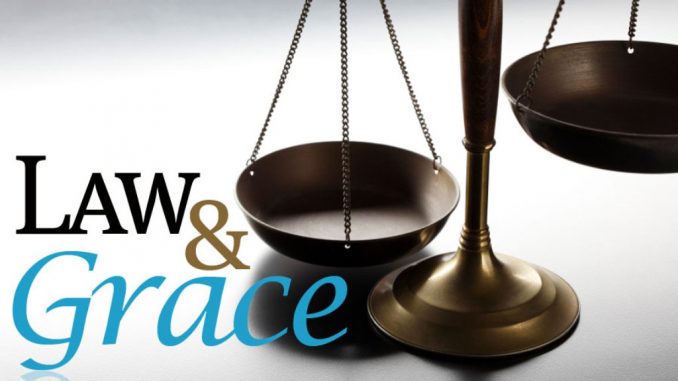
Is obedience to the law a requirement for believers saved by grace?
Obedience is an expression of our love for God. It should be the spontaneous response of sinners saved by grace. Jesus taught: “He who has My commandments and keeps them, it is he who loves Me. And he who loves Me will be loved by My Father, and I will love him and manifest Myself to him” (John 14:21).

Obedience is also a requirement God places upon us, who are recipients of His grace. This is seen in the story of the woman caught in the act of adultery (John 8:3-11). While Jesus did not condemn her, unlike the crowd, He also made it clear that she should no longer continue living a sinful lifestyle. In short, Jesus told her: “I forgive you but make sure you obey God’s law by forsaking your adulterous lifestyle.”

Though God forgives us, we need to demonstrate personal responsibility. We need to keep our end of the bargain.
The foregoing is in contrast with the teachings of hyper-grace which states that, when believers embrace grace, they do not have to be subject to the law. Obedience to the law is seen as something negative—an attempt to earn God’s blessings apart from grace.
The following (IN BLUE) is the stance taken by hyper-grace:
“While most people have no problem with agreeing that we have been saved by grace, they are nevertheless still subjecting themselves to the law. They are depending on the “works of the law” or their obedience to the law to earn, merit and deserve God’s blessings.”
“Grace is the undeserved, unmerited and unearned favor of God—the moment you try to merit the free favors of God, His grace is nullified.” (Page 262, “Destined to Reign”)
In other words, hyper-grace asserts that obedience to the law is undesirable for believers—that we should not nullify God’s grace through obedience to the law or merit points attained through “works of the law”.

Those who think that believers under grace can do away with the law need to consider Christ’s teachings: “Do not think that I have come to abolish the Law or the Prophets; I have not come to abolish them but to fulfil them. For truly, I say to you, until heaven and earth pass away, not an iota, not a dot, will pass from the Law until all is accomplished.
(Matthew 5:17-18).

Believers today are free from the yoke of the Mosaic law with its ceremonial regulations (Acts 15:10, Acts 15: 28-29, Galatians 5:1). Though we have been redeemed from the curse of the law through Christ’s death (Galatians 3:13), it does not mean we are free to break God’s moral law as revealed in the Ten Commandments.

“For the grace of God has appeared, bringing salvation for all people, training us to renounce ungodliness and worldly passions, and to live self-controlled, upright, and godly lives in the present age” (Titus 2:11-12).
Thus, grace does not free us from having to live a moral life in obedience to God’s laws.

Condemnation is reserved for those who pervert God’s grace into licentiousness: “For certain individuals whose condemnation was written about long ago have secretly slipped in among you. They are ungodly people, who pervert the grace of our God into a license for immorality and deny Jesus Christ our only Sovereign and Lord” (Jude 4).
Judgment is reserved for those who profess to follow God but practise lawlessness and fail to do his will: “Not everyone who says to Me, ‘Lord, Lord,’ shall enter the kingdom of heaven, but he who does the will of My Father in heaven. Many will say to Me in that day, ‘Lord, Lord, have we not prophesied in Your name, cast out demons in Your name, and done many wonders in Your name?’ And then I will declare to them, ‘I never knew you; depart from Me, you who practise lawlessness!’ (Matthew 7:21-23).
Those who are immoral will fail to make it to heaven: “Do you not know that the unrighteous will not inherit the kingdom of God? Do not be deceived. Neither fornicators, nor idolaters, nor adulterers, nor homosexuals, nor sodomites, nor thieves, nor covetous, nor drunkards, nor revilers, nor extortioners will inherit the kingdom of God” (1 Corinthians 6:9-10).
Are believers free from the ceremonial laws of Moses? Yes.
Are believers free from having to obey God’s timeless moral laws? No, despite the fact we are now under the dispensation of grace.
Next time, if someone asks you these two questions you should be able to give the answer.
- Is a believer’s obedience an attempt to please God through self-effort or ‘works of the law’?
- Does obedience constitute a return to legalism?
Your answer should be something like this: Obedience is the believer’s positive response to God’s grace and should not be viewed negatively as an attempt to gain God’s favour through self-effort or “works of the law”. The latter represents the false view of obedience of hyper-grace.
Obedience should be seen positively. It is God’s requirement for believers living under grace (John 8:3-11). It should be also seen as the believers’ expression of love and gratitude towards God for His undeserved grace (John 14:21).

Thus, obedience is both a requirement and a response: God’s requirement for all who are saved by grace as well as our grateful response to His grace.
If the believers’ motives are pure and the Holy Spirit’s empowerment has been sought, how can we ever deem obedience as a return to legalism or self-effort? The latter is an invention of hyper-grace.
RELATED POSTS
Some compare the Christian life to a walk in the park. They say everything is by faith. You just have to believe in what Jesus has done for you at the cross. Anything more than that smacks of self-effort, pride and legalism.
It’s great to experience God’s unmerited favour. But we must not stop there. There are other ways to gain His favour.
Many believers focus on the privileges of being a Christian and forget that there are conditions attached to the blessings. In short, blessings come with responsibilities.
Though we are saved by faith, we must not forget the fact we are destined for good works. “Was not Abraham our father justified by works when he offered up his son Isaac on the altar? You see that faith was active along with his works, and faith was completed by his works.”
Note: Dr Lim Poh Ann is a medical practitioner. He was the former editor of Asian Beacon magazine (Dec 2008 – Oct 2011). He can be reached at his Facebook page, www.facebook.com/AskDrLi
SOURCE OF ARTICLE: http://limpohann.blogspot.my/2016/05/obedience-positive-or-self-effort.html
|Share The Good News|
Dr Lim Poh Ann




Leave a Reply